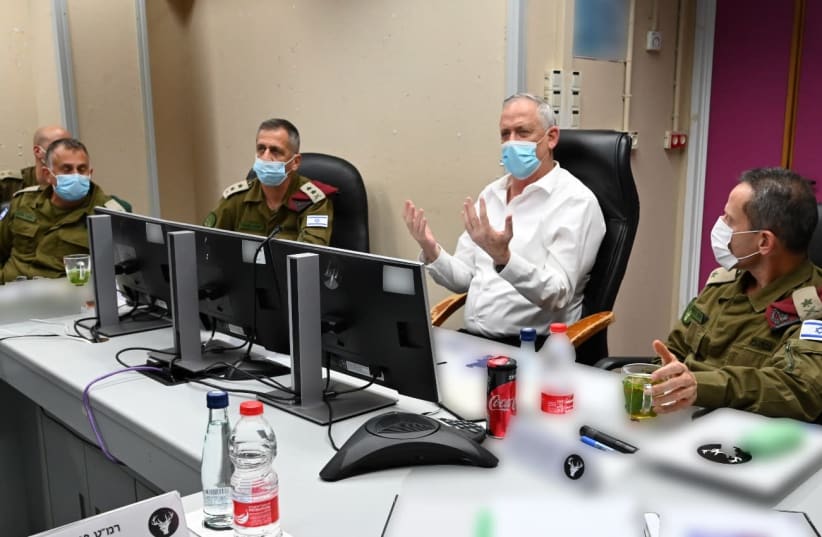As tensions remain high between Israel and Hezbollah, Alternate Prime Minister and Defense Minister Benny Gantz visited IDF Northern Command Sunday afternoon, warning that Israel will continue to protect its security interests.In the North, Gantz held a situational assessment with IDF Chief of Staff Lt.-Gen. Aviv Kochavi, OC Northern Command Maj.-Gen. Amir Baram, OC Operations Directorate Maj.-Gen. Aaron Haliva and lower-ranking commanders in the field.According to a statement released by his office, he “took a closer look at the IDF’s preparations in the face of tensions” and was impressed by the way troops are preparing throughout the North.“We believe there can be [security] events on the border. We are prepared for all possibilities,” Gantz said.“The State of Israel has no interests in Syria or Lebanon, except for security interests,” he said, adding that Israel will “continue to ensure our security interests,” which include the prevention of entrenchment by Iranian forces, the blocking of the transfer of advanced weapons and preventing the development of precision missiles in Syria or Lebanon.“The situation in Lebanon and Syria is not good, not economically, not in terms of the coronavirus and not in terms of their infrastructure,” Gantz said. “I remind both Lebanon and Syria that they are responsible for what is happening in their territory. The State of Israel will demand this responsibility. We are not looking for unnecessary escalations, but whoever tests us will meet a very strong response. I hope we will not have to use it.”Earlier in the day, Prime Minister Benjamin Netanyahu warned that Syria and Lebanon would bear full responsibility for any attack against Israel coming from their territory.Speaking at the weekly cabinet meeting, he said Israel “won’t allow Iran to entrench militarily on our northern border. Lebanon and Syria are responsible for any attack from its territory against Israel. We will not allow anyone to upend our security or threaten our citizens. We won’t tolerate any attack on our forces.”Netanyahu said he, Gantz and Kochavi were conducting ongoing situational assessments, and “the IDF is prepared to respond to any threat.”Following the alleged Israeli strikes last Monday, the Lebanese daily Al-Akhbar reported that Hezbollah had raised its alert level “to monitor activities” of IDF soldiers along the border between the two countries, and statements attributed to Hezbollah secretary-general Hassan Nasrallah suggested that Israel be wary of an attack.The strike targeted several sites around the capital, including a major ammunition depot, and killed several Iranian and Syrian personnel as well as Hezbollah terrorist Ali Kamel Mohsen.“We acted against the entrenchment of Iran in Syria,” Gantz said. “If someone is involved in Iran’s activities in Syria, which we will continue to act against, this is liable to happen.”Following a situational assessment on Friday and in accordance with Northern Command’s defensive plan, the IDF said it would be reinforcing troops, artillery batteries and enhanced field intelligence in the area “with the goal of strengthening defenses along the northern border.”The military deployed troops to Division 91 and 210 Bashan Division along with artillery and intelligence troops. Iron Dome missile-defense batteries were also on alert, as were IAF jets.Following threats by Nasrallah that the entire northern front is open for retaliation, the military has also moved some soldiers deeper into Israel out of their positions directly along the border so that they would not be a target for Hezbollah.The moves are part of the military’s strengthening of power and readiness in anticipation of any retaliation by the Lebanese Shi’ite terrorist group, which it expects against soldiers or a military installation along the border, but not against civilians.On Sunday evening, the IDF said a drone crashed in Lebanon during a routine operation along the border, but there was no risk of any intelligence being compromised.Also on Sunday evening, Lebanese media reported that the United Nations Interim Force in Lebanon (UNIFIL) peacekeepers fired in the air after two shepherds failed to stop their truck as requested. The incident, which allegedly occurred near the Lebanese village of al-Wazzani near the contested Sheeba Farms, was caught on camera.In a statement carried by L’Orient-le-Jour newspaper, the Wazzani Municipality “strongly condemned the assault, the blocking of the roads and shooting that was experienced by the residents who work in the pastures.”The municipality accused the “UNIFIL forces operating in the south, and specifically the Spanish battalion,” and asked that the agency look into the incident.In May, a Syrian shepherd identified as Mohammed Noureddine Abdul Azim was shot by IDF forces after he infiltrated into Israeli territory near Mount Dov. Azim was flown to Rambam Health Care Campus in Haifa, where he was treated for multiple gunshot wounds before being repatriated to Lebanon.Just days before the incident on Mount Dov, a senior IDF officer stationed in the area told The Jerusalem Post many shepherds in the area were known to collect intelligence on troop movements.The IDF has identified several locations along the Golan Heights where Hezbollah collects intelligence on Israel, the officer said, adding that “whoever crosses the demilitarized zone into Israel is considered a threat, and the IDF will respond accordingly.”
In North, Gantz warns that Israel will meet tests with strong response
‘We are not looking for unnecessary escalations,’ says defense minister
